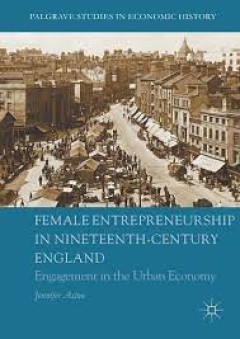Filter by

The Impact of Formal and Informal Institutions on Economic Growth A Case Stu…
Regarding the Arab region, GDP per capita virtually stagnated for more than 20 years from 1980. During the same period, GDP per capita in the world’s highly industrialized states further increased and the gap between the Middle East and North Africa (MENA) and the highly developed countries widened. However, the differences between Arab countries and the Western states exist not only economic…
- Edition
- -
- ISBN/ISSN
- 9783653008838
- Collation
- -
- Series Title
- -
- Call Number
- -

Female Entrepreneurship in Nineteenth-Century England Engagement in the Urba…
Aston challenges and reshapes the on-going debate concerning social status, economic opportunity, and gender roles in nineteenth-century society. Sources including trade directories, census returns, probate records, newspapers, advertisements, and photographs are analysed and linked to demonstrate conclusively that women in nineteenth-century England were far more prevalent in business than…
- Edition
- -
- ISBN/ISSN
- 978-3-319-30880-7
- Collation
- XVII, 257
- Series Title
- -
- Call Number
- -

Implementing open access mandates in Europe
The implementation of open access policies in Europe is a socio-technical undertaking whereby a wide range of stakeholders work together to bring out the benefits of open access for European and global research. This work provides a unique overview of national awareness of open access in 32 European countries involving all EU member states and in addition, Norway, Iceland, Croatia, Switzerland …
- Edition
- -
- ISBN/ISSN
- 9783863950958
- Collation
- -
- Series Title
- -
- Call Number
- 005 SCH i

Evolving Norms Cognitive Perspectives in Economics
This book presents institutional evolution and individual choice as codependent results of behavioral patterns. Drawing on F.A. Hayek's concepts of cognition and cultural evolution, Teraji demonstrates how the relationship between the sensory and social orders can allow economists to track social norms and their effects on the global economy. He redirects attention from the conventional focus o…
- Edition
- -
- ISBN/ISSN
- 220220101007
- Collation
- 7 b/w illustrations
- Series Title
- -
- Call Number
- -

Essays in Economic Dynamics Theory, Simulation Analysis, and Methodological …
This book reflects the state of the art in nonlinear economic dynamics, providing a broad overview of dynamic economic models at different levels. The wide variety of approaches ranges from theoretical and simulation analysis to methodological study. In particular, it examines the local and global asymptotical behavior of both macro- and micro- level mathematical models, theoretically as well a…
- Edition
- -
- ISBN/ISSN
- 978-981-10-1521-2
- Collation
- 79 b/w illustrations
- Series Title
- -
- Call Number
- -
 Computer Science, Information & General Works
Computer Science, Information & General Works  Philosophy & Psychology
Philosophy & Psychology  Religion
Religion  Social Sciences
Social Sciences  Language
Language  Pure Science
Pure Science  Applied Sciences
Applied Sciences  Art & Recreation
Art & Recreation  Literature
Literature  History & Geography
History & Geography